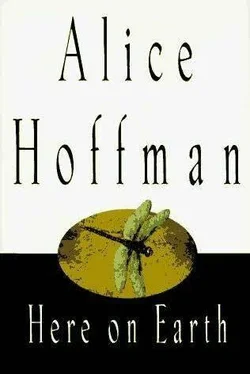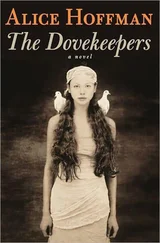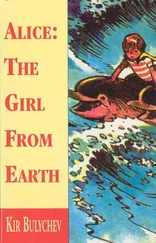Alice Hoffman - Here On Earth
Здесь есть возможность читать онлайн «Alice Hoffman - Here On Earth» весь текст электронной книги совершенно бесплатно (целиком полную версию без сокращений). В некоторых случаях можно слушать аудио, скачать через торрент в формате fb2 и присутствует краткое содержание. Жанр: Современная проза, на английском языке. Описание произведения, (предисловие) а так же отзывы посетителей доступны на портале библиотеки ЛибКат.
- Название:Here On Earth
- Автор:
- Жанр:
- Год:неизвестен
- ISBN:нет данных
- Рейтинг книги:5 / 5. Голосов: 1
-
Избранное:Добавить в избранное
- Отзывы:
-
Ваша оценка:
- 100
- 1
- 2
- 3
- 4
- 5
Here On Earth: краткое содержание, описание и аннотация
Предлагаем к чтению аннотацию, описание, краткое содержание или предисловие (зависит от того, что написал сам автор книги «Here On Earth»). Если вы не нашли необходимую информацию о книге — напишите в комментариях, мы постараемся отыскать её.
Here On Earth — читать онлайн бесплатно полную книгу (весь текст) целиком
Ниже представлен текст книги, разбитый по страницам. Система сохранения места последней прочитанной страницы, позволяет с удобством читать онлайн бесплатно книгу «Here On Earth», без необходимости каждый раз заново искать на чём Вы остановились. Поставьте закладку, и сможете в любой момент перейти на страницу, на которой закончили чтение.
Интервал:
Закладка:
March locked the terrier in the pantry, where it whined all night long. She was waiting for Hollis when he arrived, and she didn’t stop him from kissing her as they stood in the front hall; she didn’t refuse to go up to the attic, or lock the door, or go back to that small metal bed, where they’d made love so many times before. The attic was dusty and there was evidence that mice and starlings had been living there, but March paid no attention. By the time Hollis left, it was already light, although, thankfully, this was one morning when Gwen slept late. March’s lips were puffy and bruised and there were spiderwebs in her hair, but Gwen didn’t seem to notice when she came into the kitchen for some orange juice.
“Where’s the dog?” Gwen had asked, and only then did March remember she’d left the poor creature in the pantry. When she let Sister out, the dog backed away from March, as if it were the only one who knew what a conniver March really was.
The cranberry-walnut tart and cookies she’s bought at the farmers’ market, for instance, have a devious purpose: Hollis and Hank have been invited to tea, and March, although she’s no Judith Dale and wouldn’t dream of baking anything herself, still wants to impress her guests. She wants it to be possible for them to all sit down in the same room and, if nothing more, be civil to one another.
“Don’t have them over,” Gwen said when March approached her with the idea earlier in the day. “Hank’s none of your business, even if we do come from the same family.”
“There’s no reason to do this,” Hollis told March when she went ahead and invited them over for tea. “They’re kids. It doesn’t matter if we accept them-they’re going to do what they want-and I don’t give a damn if they accept us.”
Hollis isn’t pleased with the effects of Hank’s infatuation. Hank is even more dreamy and thoughtless than usual. He knocks over cups of coffee and steps on his own feet; he comes into the kitchen in the morning looking so rumpled and confused you’d think he was sleeping in a bale of hay. That little girl of March’s has him all caught up, and it’s truly pathetic to see.
“Idiot,” Hollis tells him, when Hank is late for school or when he’s forgotten his chores. “Take a good look at yourself.”
Hollis cannot understand how a person could give up so much control. He couldn’t do it; it’s simply not in his nature. The idea of being told what to do, or how to feel, turns him inside out. After all these years, the greatest pleasure he has ever known was paying off his debt to Alan Murray. Hollis still keeps the itemized bill of all that he owed the Murrays in his wallet, folded neatly into quarters. This is the invoice he was presented with on the day of Henry Murray’s funeral, and it charged for every day Hollis had lived with the family; the estimated cost of all meals had been tallied, along with books and clothing, even toothpaste. Each day he continued to live at Fox Hill raised Hollis’s debt, until it seemed he would never pay it off, and yet, he did.
All he had planned to do when he went away was earn enough to take March out of there, but the situation got complicated, as it always does when fast money is offered to someone who’s insatiable. The plan changed daily, in terms of exactly how much he would need. First it was enough for an apartment in another town, then in Boston; then it was a house he needed to present to her, a house bigger than the one where she grew up. Finally, it was the land they had surveyed on that day when they hid behind the stone wall. Nothing less would do.
Hollis didn’t even realize how much time had passed until he came back to town: The boys he’d gone to school with were men now, with wives and families. The linden trees planted around the town square the year he left, thin seedlings that needed to be propped up with posts, had become tall enough to cast shadows that covered the square entirely. If he had been able to buy the land surrounding Olive Tree Lake, he would now be the largest landowner in three counties. If anyone thinks this is meaningless, then he’s never had a banker call him sir; he’s never had one of the residents of town, who once helped tie a defenseless boy to a tree and leave him in the woods at dark, politely wish him a good day and move aside, quickly, to let his old hostage pass by.
Today, when he knocks on the door at Fox Hill-a silly formality, seeing that he owns the place-Hollis has nearly everything he’s ever wanted, but he’s in a foul mood anyway.
“Go ahead,” he tells Hank when March comes to the door. “Go in.”
Hank has dressed in his best clothes for the occasion, and he formally shakes March’s hand.
“You look so much like Alan,” March says.
Hank looks at her, confused, uncertain as to whether she’s greeted him with a compliment or a curse.
“He had your color hair,” March explains, suddenly nervous in the boy’s presence. “But you’re much taller,” she adds when she sees the worried look on Hank’s face.
“Oh.” Hank nods, grateful to March for granting him that dissimilar feature.
“What is this supposed to be?” Hollis asks.
Sister is standing guard in the hallway, emitting a low, throaty growl.
“It’s a West Highland terrier,” March says. “Judith’s.”
“Are you telling me it’s a dog?” Hollis says.
March laughs. “That’s what I’m telling you.”
“Well, then I have to believe it. Seeing how it comes from you.” He moves toward March, and the dog growls again. “What are you looking at?” Hollis asks the terrier, who is watching him warily and snarls when spoken to.
“She seems to hate you,” March teases.
“I don’t mind. Let her.” Hank has gone on ahead, so Hollis takes the opportunity to draw March near. “You’re the one whose opinion interests me.” He circles her waist and whispers, “I could show you what I mean. Let’s get rid of the kids.”
“Kid,” March corrects. “Gwen’s not here.”
Hank is in the living room, stoop-shouldered beneath the low ceiling, disappointed when he’s told Gwen hasn’t appeared.
“You’d better watch out,” Hollis suggests to the boy, after March has gone to get the tea both Hank and Hollis will politely force themselves to drink. “If you mattered to her, she’d be here.” He lets the boy think that one over; maybe now Hank won’t let himself be led around by the nose.
But in fact, Gwen’s decision not to be at home for her mother’s little get-together has nothing to do with Hank, or her desire to be with him. When she left the house early that morning, with a bunch of carrots in her pockets, she had already made up her mind that she wouldn’t be home at the appointed hour. She walked quickly down the road to the Farm in the cold morning air, with no intention of being sociable with Hollis, or allowing her mother to butt into her life. Gwen likes the empty road these days; if she’s quiet enough she can spy weasels running along the stone walls and field mice searching the ground for acorns. To her great surprise, Gwen likes all sorts of things she would never have thought she could tolerate.
Back in California, Gwen would sleep all day if allowed; she’d slam at her clock radio until she hit the snooze button, and be late for school four days out of five. Who was that girl? she wonders now, as she pulls on a second pair of gloves and jumps over ruts in the road. If she passed by that girl right now, she’d think, Poor lazy know-nothing, and she’d keep right on going. Most days, Gwen is at the barn at five-thirty, and Tarot is always waiting for her, pushing his nose up against her as soon as she enters his stall, searching for carrots and apples. Usually, she doesn’t ride him; instead she brings him down to the farthest, widest pasture and lets him take off. To see him run is to witness a miracle. Every once in a while, on those days when Hank doesn’t meet her down at the fields with a thermos of coffee, she does a foolish, dangerous thing. She rides Tarot at full speed, which is nothing compared to what he used to do on the track, but leaves her breathless all the same.
Читать дальшеИнтервал:
Закладка:
Похожие книги на «Here On Earth»
Представляем Вашему вниманию похожие книги на «Here On Earth» списком для выбора. Мы отобрали схожую по названию и смыслу литературу в надежде предоставить читателям больше вариантов отыскать новые, интересные, ещё непрочитанные произведения.
Обсуждение, отзывы о книге «Here On Earth» и просто собственные мнения читателей. Оставьте ваши комментарии, напишите, что Вы думаете о произведении, его смысле или главных героях. Укажите что конкретно понравилось, а что нет, и почему Вы так считаете.












